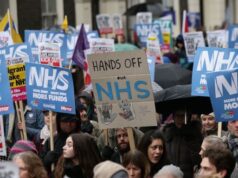TODAY IS WORLD MENTAL HEALTH DAY
‘What’s the point of waking up each day feeling physically fine but wanting to kill yourself?’
One in five adults in Britain have mental health problems. One in ten children have mental health problems. (World Health Organisation data and other sources). That’s over 5 million adults and some 1.7 million children.
Last year the total NHS budget spend was £115 billion Of this just £12.2 billion was spent on mental health services. This really is the world upside down.
What Are Primary Care Networks (PCNs) All About? Will PCNs Actually Improve GP Services?
The first thing to say about PCNs is that they are informal and non-statutory. The idea, apparently, is by PCNs hiring non-GP staff, it will free up GPs to focus on patients with complex needs. This initiative is of course driven by the chronic shortage of GPs. These non-GP staff are Clinical Pharmacists and Social Prescribing Link Workers (SPLWs), first contact Physiotherapists, Physician Associates and Community Paramedics. £1.799 billion has been allocated to fund this, but as ever with the NHS there’s no explicit clarity as to exactly when and over what period this cash will be deployed.
It’s interesting, perhaps, to review what it would cost to hire and deploy these people for a year. On average it appears recruiting any one of these staff costs £4,5000. So if a PCN hires one of each of these roles it will cost £22,500.
Annual salaries plus an estimated ‘on’ cost of 40% would be:
Clinical Pharmacist: £35000 + 40% = £49,000
SPLW: £25,000 + 40% = £35,000
Physiotherapist: £34,000 + 40% = £47,600
Physician Associate: £30,000 + 40% = £46,000
Paramedic: £28,000 + 40% = £39,200
For all roles except the SPLW the PCN will be re-imbursed 70% of the cost. For the SPLW it will be 100%. There is a financial cap on this. Will this be for every year (until Eternity?) It seems recruitment costs will not be mitigated by re-imbursement. As well as this grant funding each PCN will receive £4.7111/patient for ‘core’, ‘extended hours’ and ‘network participation’. Is this every year?
All but one of the 76 GP Practices in Ealing has signed up to a PCN contract. Exactly how many of the above roles each PCN will recruit is an unknown. Also unknown is whether there will be enough people on the market to fill all these roles? And if there are, will this leave ‘gaps’ in Community or Secondary Care services?
In my PCN (South Central Ealing) there are 50,662 patients. My own GP Practice had already hired its own Pharmacist so this will ease the pressure on one grant-aided PCN Clinical Pharmacist. However one Physiotherapist shared amongst 50,662 patients could be a bit of a stretch.
Petition Launched to Stop CCG Mergers Which Are Attempting to Legitimise Non-Statutory Integrated Care Systems (ICSs)
All NHS commissioning bodies (bar a handful maybe!) are in some sort of merger turmoil as NHS England mandates one CCG per STP/ICS.
The 999 Call/KONP petition calls this out as a device to circumvent existing legislation and demands legislative changes or Parliamentary debate to legitimise ICSs.
Sign at:
http://bit.ly/ParliamentaryStopCCGMergers
CCGs – the 191 Clinical Commissioning Groups in England.
STP – Sustainability and Transformation Plan (or Provider): an October 2016 NHSE attempt at a five year change programme to deliver integrated healthcare and social care services.
ICS – Integrated Care System: an informal NHSE construct which is the current vehicle for integrated healthcare and social care commissioning and service delivery.
999 Call For the NHS is an independent, voluntary grassroots campaign group.
KONP – Keep Our NHS Public: an independent campaign group opposing NHS privatisation and underfunding.
112,000+ Quit Their Jobs in 2018 to Care For Relatives with Dementia
‘The Times’ of 28 September 2019 reported this huge number extracted from a report published by the Centre for Economic and Business Research. The report used data from the NHS and the Office for National Statistics (ONS).
The figure is up from the 2017 estimate of 50,000. Further to this, 147,000 people in 2018 reduced their hours at work or struggled to reduce their working hours to balance work with caring.
Dementia care, unlike care for those with heart attacks and cancer, is not free at the point of use – It’s means tested. Social care budgets are set to be cut by another £700 million in the next year as Local Authorities try to balance their books.
726 Homeless People Died in England and Wales in 2018: 20% More Than in 2017
Of these 726, just under half the deaths are blamed on drug overdoses and most were men aged 45 or over. The ONS began collecting these figures in 2013. This year’s figure is the highest recorded so far. The highest number of deaths were reported in London at 146.
ONS figures also show a 39% increase in over 60 year olds applying to Councils for temporary accommodation. The figure in 2012/13 was 1,800 and in 2017/18 it was 2,500.
The only country in Europe where homeless numbers are falling is Finland. Since 2007, Finland has had a ‘Housing First’ policy and gives those in need a permanent home as soon as possible.
NHS England (NHSE) Spending on the Independent Sector is Around 26% per Year and Not 7% as Widely Mis-Reported
A report by a highly respected and experienced former healthcare professional regulator has revealed that the widely touted 7% NHSE spend on the independent sector is way off mark. He powerfully argues that the real figure is around 26%.
David Rowland, the author of the report, Is the Director of the Centre for Health and the Public Interest. Prior to his current role he was Head of Policy at three national regulators and is a recognised social care policy expert.
Rowland carried out a comprehensive review of six years of accounts produced by the Department of Health and Social Care (DHSC). He found that the distinction between expenditure on different types of non-NHS bodies does not stand up to scrutiny. He also discovered that major items of expenditure on the private sector which are detailed in the accounts are excluded from the DHSC’s calculations.
On the basis of his re-worked calculations for 2018/19, £29 billion was spent by NHSE on the independent sector which is around 26% of total expenditure.
The research has also highlighted that spending on social care services has declined by some £450 million since 2014.
Four Seasons Care Homes Business is Struggling: 320 Care Homes and 170,00 Care Beds At Risk
‘The Times’ 4 October 2019 reported that the UK’s second largest care home operator – Four Seasons – has withheld rent payments to landlords without warning. Administrators were appointed to run Four Seasons in April 2019 and so far all their care homes remain open and not subject themselves to Administration.
Advinia Group – With 38 Care and Nursing Homes, 3,250 Beds and 4,500 staff – Under Financial Scrutiny by CQC
‘The Guardian’ of 7 October 2019 has reported that the Advinia Group is under financial investigation by the Care Quality Commission (CQC). CQC wants to carry out an Independent Business Review (IBR) of Advinia’s finances, but the company is failing to co-operate.
After borrowing £59 million from BUPA it now needs to repay Credit Suisse £6.2 million in May 2020. An indication of the company’s financial turbulence is that in summer 2019 it went through four Financial Directors in just five months!
Eric Leach




